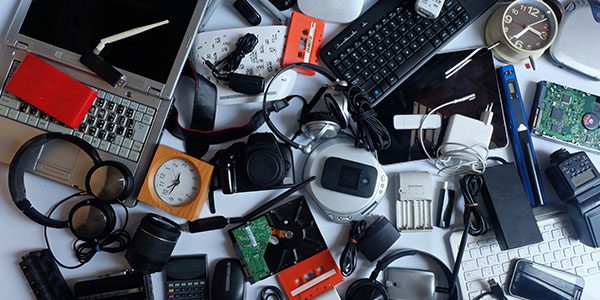Lasting Electronics Disposal: Make Sure Compliance with R2 Certification
Wiki Article
Elevate Your E-Waste Administration With R2 Qualification: a Comprehensive Summary
One key approach to elevate e-waste administration practices is by acquiring R2 accreditation. By exploring the processes and advantages associated with R2 qualification, a deeper understanding of just how it can reinvent e-waste monitoring techniques emerges, shedding light on a path in the direction of sustainability and moral disposal techniques.Significance of E-Waste Administration

When e-waste is not managed correctly, these harmful compounds can leak into the environment, creating damage to wild animals and possibly entering the food chain, presenting risks to human wellness. In addition, the inappropriate disposal of e-waste adds to contamination and greenhouse gas exhausts, aggravating climate modification and ecological deterioration.

Advantages of R2 Certification

Firstly, R2 qualification improves reputation by showcasing an organization's dedication to sustainable methods. It assures clients, partners, and stakeholders that the company complies with stringent criteria for e-waste management - r2 certification. This trustworthiness can lead to increased trust and enhanced partnerships with clients that prioritize ecological obligation
Second of all, R2 accreditation assists reduce dangers connected with improper e-waste disposal. By adhering to the rigorous guidelines stated by the qualification, organizations can decrease the chance of information breaches, ecological contamination, and lawful effects. This aggressive strategy safeguards the company's credibility and minimizes possible liabilities.
Last but not least, R2 accreditation shows a commitment to ecological stewardship - r2 certification. By sensibly handling digital waste through accredited procedures, organizations add to the preservation of resources, reduction of contamination, and promo of a round economic situation. This commitment not only benefits the atmosphere however additionally lines up with developing customer assumptions for sustainable service techniques
R2 Qualification Refine Overview
Having developed the advantages of R2 certification in advertising trustworthiness, danger mitigation, and environmental stewardship, it is vital to currently describe the in-depth process included in acquiring this qualification. The R2 certification procedure starts with a detailed testimonial of the organization's functional policies and treatments to make sure conformity with the R2 criterion. This preliminary assessment is important in recognizing any type of gaps that need to be dealt with before proceeding better.Once the company's practices align with the R2 standard needs, an independent third-party auditor conducts an on-site audit to assess the implementation and efficiency of these methods. This audit consists of a detailed review of documentation, interviews with personnel, and physical evaluations of centers to confirm conformity.
Following a successful audit, the company obtains a certification decision based on the auditor's searchings for. If approved, the company is granted R2 qualification, showing its dedication to accountable e-waste administration. It is important to note that preserving R2 qualification calls for ongoing compliance with the requirement's demands and routine audits to make certain ongoing adherence to ideal methods in e-waste recycling and my website disposal.
Secret Criteria for R2 Conformity
A vital facet of attaining R2 conformity is guaranteeing that all digital waste (e-waste) handling centers satisfy rigorous environmental and safety and security criteria. To abide by R2 demands, companies must comply with essential requirements that concentrate on accountable e-waste management practices. These criteria consist of applying a recorded environmental, wellness, and safety and security monitoring system, making sure the secure handling of data-containing gadgets, and conducting extensive downstream due persistance to track the last destination of e-waste materials.Additionally, R2 compliance necessitates the proper screening, refurbishment, and recycling of digital tools to extend its valuable life and reduce ecological influence. Facilities looking for R2 qualification need to also focus on employee health and wellness and security by offering essential training, individual protective equipment, and a risk-free workplace. In addition, preserving in-depth records of e-waste processing tasks and on a regular basis undertaking audits by certified certifying bodies are vital parts of showing ongoing conformity with R2 criteria.
Effects of Sustainable E-Waste Practices
The implementation of lasting e-waste methods according to R2 compliance not only guarantees ecological and safety requirements are met yet additionally significantly influences the total lifecycle of digital products. By sticking to R2 requirements, electronic waste management processes come to be much more reliable, reducing the ecological footprint of electronic items. Lasting e-waste methods help with the correct check this disposal of digital components, making sure that unsafe products are handled sensibly and do not end up contaminating the atmosphere.Moreover, accepting lasting e-waste techniques promotes the circular economic climate by facilitating the recuperation and reuse of beneficial products from electronic products. This not just conserves priceless resources yet likewise decreases the need for raw material removal, decreasing the ecological influence of digital production. Additionally, lasting e-waste practices can add to job creation in the recycling and repair fields, fostering economic development while advertising environmental responsibility. Overall, the fostering of sustainable e-waste methods under R2 certification functions as a crucial action in the direction of attaining a more ecologically lasting electronics industry.
Verdict
To conclude, applying appropriate e-waste administration techniques is essential for environmental sustainability and page source conservation. R2 certification plays a key role in making certain accountable handling and disposal of electronic waste. By sticking to the strict criteria stated by R2 standards, organizations can not only reduce their ecological effect but likewise add to a more lasting future for generations to find.One key approach to boost e-waste management practices is by obtaining R2 accreditation. By discovering the advantages and processes connected with R2 accreditation, a much deeper understanding of just how it can revolutionize e-waste management approaches emerges, losing light on a path towards sustainability and ethical disposal practices.
The R2 certification procedure starts with a complete evaluation of the company's functional policies and procedures to ensure compliance with the R2 standard. If authorized, the organization is approved R2 accreditation, showing its dedication to accountable e-waste management. On the whole, the adoption of lasting e-waste methods under R2 accreditation offers as a vital step towards achieving a much more ecologically lasting electronics industry.
Report this wiki page